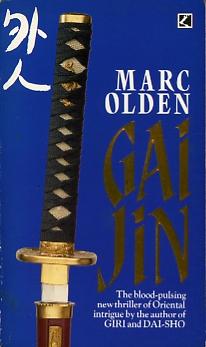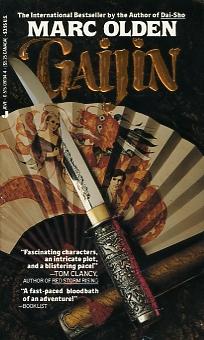Oh, to be a supergaijin
Olden's outlandish storyteller's illusion
By William Wetherall
A version of this article appeared in
The Japan Times, 25 March 1987, page 12 (Focus)
A much shorter version earlier appeared as
"Japan in Pulp (1): Bushido and Crime" in
Asahi Evening News, 4 December 1986, page 6
Marc Olden Give a monkey 600 years to type one group of any six letters every minute, without repetition and regardless of meaning, and gaijin will appear somewhere on the list of 300 million combinations. The word means "outsider" in Japanese, but some non-Japanese simians find it as offensive as nigger, spic, kike, wop, wog, chink, gook, and jap. Marc Olden, of course, is no monkey. It took him only a few years to begin to ape James Clavell's success and come up with Shogunesque titles like Giri, Dai-Sho, and now Gaijin Vital update -- The speed with which Olden chanced upon Gaijin cannot be over appreciated. It took Clavell a few more years of pounding away at the keyboard to stumbled across Gai-Jin, which came out in 1993. The Institute for Postmodern Primate Studies is now conducting preliminary research on the evolutionary significance of hyphenated outlanders as objects of discourse in fiction. Gaijin is one of those stories in which the hero is only half-good and the villain is only half-evil. The latter, English aristocrat Rupert de Jongh, is ostracized by his peers when he fights against the "white only" rules of British clubs on behalf of a Japanese friend, rejects his own country and ends up a Japanese agent in Germany. During the war, he earns the lifelong enmity of American code-breaker Alexis Bendor when he kills her comrades and lops off one of her ears. When the war ends, de Jongh becomes Yamaga Razan, and, as the boss of Japan's largest yakuza gang, he "wielded power with absolute energy, and terror." Forty years later, de Jongh and Alexis sight each other in Hawaii and their rivalry resumes. Alexis is heroically defended and avenged by son Simon, a golden boy athlete born in California and raised in Hawaii, Simon had learned "the ancient principles of Mikkyo," as well as karate and ninjutsu, from a Japanese American who had been his mother's lover. Society thinks that Simon in a businessman, but her had been a thief since finishing a Vietnam tour with a special CIA unit, Simon is addicted to stealing for the excitement rather than the money. His victims are wealthy East Coast hypocrites what deserve to be ripped off by a Robinhood ninja who can will himself unseen. Roaming masterThe story is just implausible enough for a worst-of-the-year Hollywood film, and Olden's asides on Japanese culture and behavior are down to his usual standards. When all is read and thrown out with the trash, what sticks in the bowels is the fantasy of being a Supergaijin who can roam almighty on Japanese turf. Though de Jongh bore a Japanese name, "He was the gaijin and he did as he pleased." For "Even the most xenophobic Japanese had been forced to admit how good he was. . . . And because he was as merciless as any feudal warrior, he had made the word gaijin a term of respect, a word to be feared." De Jongh lived up to his vows because "he was more Japanese than the Japanese." He is the archetype overnight master of strange tongues and mysterious cultures. He was able to "converse adequately" in Japanese within a month, and he quickly mastered Japanese musical instruments, calligraphy, haiku, and the martial arts. But de Jongh's "primary accomplishment, one unheard of for a Westerner" was "complete acceptance at the highest military and social levels." So completely and he passed as Japanese that when he died. "Rumors that Razan might actually have been a Westerner were never confirmed." De Jongh's secret is revealed through the deja vu sensations that he feels each time he encounters something "new" about Japan, and through flashbacks in his dreams. He is not really a Westerner, but the reincarnation of a 17th-century samurai. Alas, not even in popular fiction can a mere gaijin become a True Son of Nippon. The Supergaijin who proves that things Japanese are scrutable, and that ex-Westerners can flash Japanese passports with impunity, must remain an outlandish storyteller's illusion. Perennial stereotypesLike Olden's other Japan novels, this one tries to "explain" Japan to readers who savvy stereotypes. Practically all Japan novels repeat the perennial cliches about Japanese attitudes toward death, and this one is no exception. "In Japan," Olden writes, "the dead were more important than the living and always had to be kept alive in memory." Though Olden sets his story in the 1980s, his clipping files date from the late 1960s and early 1970s. "Air pollution in Japan was so serious and life threatening that gas masks were sold everywhere." Olden believes that Japanese are quiet. He attributes this to "Japanese self-control, developed from living hundreds of years in crammed, flimsy houses, which allowed no room for privacy and individualism. Self-control born of fear, because severe punishments by generations of samurai had guaranteed obedience to even the harshest social code." Minorities galoreGaijin features a zoo of nationalities races, and ethnicities\: Americans, British, Germans, Japanese, Koreans, Spanish, Italians, Irish, Greeks, Mexicans, and Dominicans; Japanese Americans good and bad; whites, blacks, and mulattoes; pure-blooded Hawaiians and mixed bloods; and the usual assortment of skin, eye, and hair colors. Censorable subclassesOlden describes a variety of marginal classes, past and present. Alexis is told by a former colleague that yakuza meant "loser" in a card game introduced to Japan by Dutch sailors in the 16th century. "Around that time feudal Japan's losers -- including peasants, the homeless, clerks -- banded together to resist those samurai who, lacking steady employment with a warlord, roamed the country taking advantage of anyone weaker than they. Joining these medieval losers were the buraku-min, those who performed what were considered subhuman tasks. They were butchers, leather tanners, handlers of dead bodies, and those who cleaned the filth and dead animals from temples. They were untouchables, among the most despised people in Japan. True losers or yakuza." Like descriptions of Japan's social minorities in most other Japan novels, this is inaccurate in too many ways to fully correct here. Suffice it to say that no "burakumin" existed in medieval Japan. This term is a present-day reference to people who continue to be discriminated against because they live in neighborhoods that used to be populated by eta (much filth) and hinin (non-humans). These are the correct historical names of two subclasses which were officially emancipated in 1872 [1871]. Clavell's many mentions of eta were censored from the 1980 Japanese translation of Shogun. Reischauer's entire discussion of eta and burakumin was expurgated from the 1979 "complete" translation of The Japanese (1977). Such views of Japanese character are unlikely to flatter. Japanese can hardly be blamed for disliking such books, however much their own popular culture is similarly filled with ethnocentric distortions and traditional fears about other peoples. |

